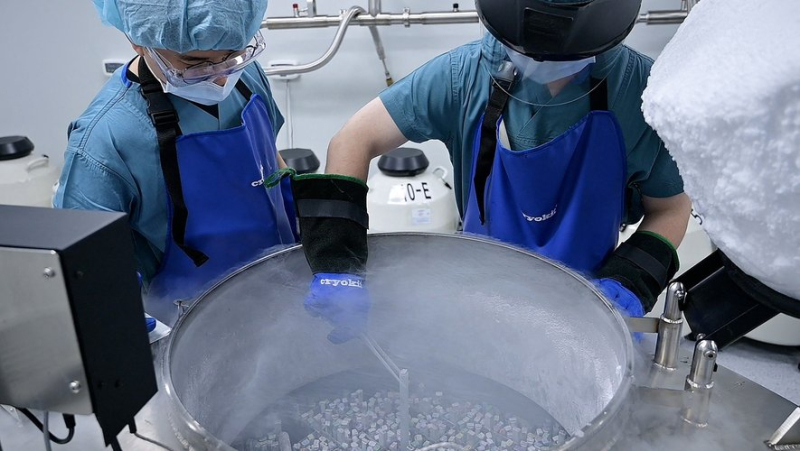Against the birth crisis, Seoul subsidizes egg freezing

Les autorités de Séoul proposent de subventionner la congélation des ovules, même si les experts estiment que cette initiative ne parviendra probablement pas à inverser le déclin démographique du pays. Yelim LEE/AFPTV/AFP
Face à un taux de natalité qui n'en finit pas de baisser en Corée du Sud, la capitale Séoul a choisi d'innover, en subventionnant la congélation des ovules.
With just 0.7 births per woman at the end of 2023, South Korea has one of the lowest birth rates in the world, well below the replacement rate, meaning its population is rapidly aging and declining .
The government has already invested billions of dollars to try to encourage the birth rate. Seoul authorities are now proposing to subsidize egg freezing, although experts say the move is unlikely to reverse the country's population decline.
Jeong, in his forties, decided to seize this opportunity. "I was under pressure to have a child because of my age, which pushed me to try to get married quickly" , explains this Korean woman, who only agrees to be identified by her last name.
"When I reached my mid-thirties, I suggested to the men I've been in relationships with that we get married as soon as possible, but that didn't happen. #39;didn’t work, she continues.
Egg freezing theoretically allows women to preserve their fertility. But the chances of success are higher for those who do it before egg quality begins to decline, generally from age 38.
"Investing in future births"
Jeong therefore turned to a backup solution, freezing her eggs, and says she no longer feels "as anxious" to be single or risk not having children.
"Now that I have my frozen eggs as insurance, I can take my time"to find the right person, she told AFP.
Seoul felt that helping women freeze their eggs was "the most practical solution" for "investing in potential future births", indicates the town hall.
According to her, "while the age of marriage and childbearing continues to decline and women's participation in society becomes more important, there is growing interest from single women who aspire to be able to conceive and give birth in the future.
Concretely, however, this program will only help women who marry and have a baby through intrauterine insemination (IUI) or in vitro fertilization (IVF), because these procedures are practically impossible to obtain for single couples or same-sex, with many clinics requiring marriage certificates.
Egg freezing technology has been available in South Korea since the late 1990s, but the procedure was little known and in low demand.
Until recent years, only women with cancer, who were at risk of losing their fertility, were interested in this procedure, says Cha Kwang-yul who heads the CHA Medical Center. Recently, "the culture has changed and people have started saying 'if you're not going to get married, save your eggs'" .
"N-Po Generation"
These measures, however, do not take into account major societal changes, according to experts.
Young South Koreans describe themselves as the "n-Po" generation, that is, those who have abandoned many of the goals of their elders such as marriage, parenthood and homeownership, due to stagnant growth and intense competition for jobs.
In 2022, there were 3.7 marriages per 1,000 people in South Korea, a historic low. And single-person households now represent 41% of the total.
Single parenthood, however, remains very stigmatized in this country and marginal, explains to AFP Hyeyoung Woo, professor of sociology at Portland State University, in the United States.
In 2020, only 2.5% of South Korean babies were born out of wedlock, compared to 40% on average in the OECD.
Subsidizing egg freezing "will not effectively tackle Korea's low birth rate", she estimates.
She instead recommends encouraging marriages, or a second child, through housing and tax assistance measures, childcare and parental leave .
The country must also "become more accepting of the various forms of family”, by helping singles and couples of same sex if they want to have children, she suggests.




